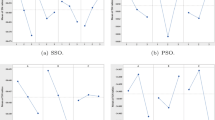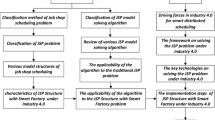Abstract
This paper studies a hybrid flow shop scheduling problem (hybrid FSSP) with multiprocessor tasks, in which a set of independent jobs with distinct processor requirements and processing times must be processed in a k-stage flow shop to minimize the makespan criterion. This problem is known to be strongly nondeterministic polynomial time (NP)-hard, thus providing a challenging area for meta-heuristic approaches. This paper develops a simulated annealing (SA) algorithm in which three decode methods (list scheduling, permutation scheduling, and first-fit method) are used to obtain the objective function value for the problem. Additionally, a new neighborhood mechanism is combined with the proposed SA for generating neighbor solutions. The proposed SA is tested on two benchmark problems from the literature. The results show that the proposed SA is an efficient approach in solving hybrid FSSP with multiprocessor tasks, especially for large problems.
Similar content being viewed by others
References
Johnson S (1954) Optimal two and three stage production schedules with set-up times included. Nav Res Logist 1:61–68
Lee C-Y, Vairaktarakis GL (1994) Minimizing makespan in hybrid flowshops. Oper Res Lett 16:149–158
Haouari H, M’Hallah R (1997) Heuristic algorithms for the two-stage hybrid flowshop problem. Oper Res Lett 21:43–53
Riane F, Artiba A, Elmaghraby SE (1998) A hybrid three-stage flowshop problem: efficient heuristics to minimize makespan. Eur J Oper Res 109:321–329
Linn R, Zhang W (1999) Hybrid flow shop schedule: a survey. Comput Ind Eng 37:57–61
Ercan MF, Fung Y-F, Oğuz C (2001) Scheduling image processing tasks in a multilayer system. Comput Electr Eng 27:429–443
Ercan MF, Oğuz C (2005) Performance of local search heuristics on scheduling a class of pipelined multiprocessor tasks. Comput Electr Eng 31:537–555
Oğuz C, Ercan MF, Cheng TCE, Fung YF (2003) Heuristic algorithms for multiprocessor task scheduling in a two-stage hybrid flow-shop. Eur J Oper Res 149:390–403
Krawczyk H, Kubale M (1985) An approximation algorithm for diagnostic test scheduling in multicomputer systems. IEEE T Comput 34:869–872
Guan Y, Xiao WQ, Cheung RK, Li CL (2002) A multiprocessor task scheduling model for berth allocation: heuristic and worst-case analysis. Oper Res Lett 30:343–350
Graham RL, Lawler EL, Lenstra JK, Rinnooy Kan AHG (1979) Optimization and approximation in deterministic sequencing and scheduling: a survey. Ann Discret Math 5:287–326
Oğuz C, Qi XT, Fung YF (1998) Scheduling multiprocessor tasks in a hybrid flow-shop using a genetic algorithm. Working Paper No. 11/97-8, Faculty of Business and Information System, The Hong Kong Polytechnic University, Hong Kong
Oğuz C, Zinder Y, Do VH, Janiak A, Lichtenstein M (2004) Hybrid flow-shop scheduling problems with multiprocessor task systems. Eur J Oper Res 152:115–131
Ying K-C and Lin S-W (2009) Scheduling multistage hybrid flowshops with multiprocessor tasks by an effective heuristic. Int J Prod Res 47:3525–3538
Oğuz C, Ercan MF (2005) A genetic algorithm for hybrid flow-shop scheduling with multiprocessor tasks. J Sched 8:323–351
Ying K-C and Lin S-W (2006) Multiprocessor task scheduling in multistage hybrid flow-shops: an ant colony system approach. Int J Prod Res 44:3161–3177
Sivrikaya-Serifoğlu F, Ulusoy G (2004) Multiprocessor task scheduling in multistage hybrid flow-shops: A genetic algorithm approach. J Oper Res Soc 55:504–512
Kennedy J, Eberhart RC (1995) Particle swarm optimization. In: Proceedings of IEEE International Conference on Neural Networks, 1942–1948
Tseng C-T and Liao C-J (2008) A particle swarm optimization algorithm for hybrid flow-shop scheduling with multiprocessor tasks. Int J Prod Res 46:4655–4670
Ercan MF (2008) A hybrid particle swarm optimization approach for scheduling flow-shops with multiprocessor tasks. In: 2008 International Conference on Information Science and Security
Jouglet A, Oğuz C, Sevaux M (2009) Hybrid flow-shop: a memetic algorithm using constraint-based scheduling for efficient search. J Math Model Algor 8:271–292
Kirkpatrick S, Gelatt CD, Vecchi MP (1983) Optimization by simulated annealing. Science 220:671–680
Van Laarhoven PJM, Aarts EHL, Lenstra JK (1992) Job shop scheduling by simulated annealing. Oper Res 40:113–125
Mathirajan M, Bhargav V, Ramachandra V (2010) Minimizing total weighted tardiness on a batch-processing machine with non-agreeable release times and due dates. Int J Adv Manuf Tech 48:1133–1148
Damodaran P, Chang PY (2008) Heuristics to minimize makespan of parallel batch processing machines. Int J Adv Manuf Tech 37:1005–1013
Zegoridi SH, Itoh K, Enkawa T (1995) Minimizing makespan for flow shop scheduling by combining simulated annealing with sequencing knowledge. Eur J Oper Res 85:515–531
Dipak L, Chakraborty UK (2009) An efficient hybrid heuristic for makespan minimization in permutation flow shop scheduling. Int J Adv Manuf Tech 44:559–569
Sivrikaya SF, Tiryaki IU (2002) Multiprocessor task scheduling in multistage hybrid flow-shops: a simulated annealing approach. In: Proceedings of the 2nd International Conference on Responsive Manufacturing, Gaziantep, Turkey, pp 270–274
Chou FD (2009) An experienced learning genetic algorithm to solve the single machine total weighted tardiness scheduling problem. Expert Syst Appl 36:3857–3865
Henderson D, Jacobson SH, Johnson AW (2003) The theory and practice of simulated annealing. In: Glover F, Kochenberger G (eds) Handbook of metaheuristics. Kluwer Academic Publishers, Dordrecht, pp 219–249
Dongarra JJ (2009) Performance of various computers using standard linear equations software. Report CS-89-85. http://www.netlib.org/benchmark/performance.pdf
Author information
Authors and Affiliations
Corresponding author
Rights and permissions
About this article
Cite this article
Wang, HM., Chou, FD. & Wu, FC. A simulated annealing for hybrid flow shop scheduling with multiprocessor tasks to minimize makespan. Int J Adv Manuf Technol 53, 761–776 (2011). https://doi.org/10.1007/s00170-010-2868-z
Received:
Accepted:
Published:
Issue Date:
DOI: https://doi.org/10.1007/s00170-010-2868-z




